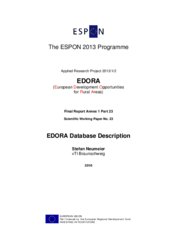EDORA - European Development Opportunities in Rural Areas
Thematic scope
The reform of the Common Agricultural Policy in the framework of the Agenda 2000 boosted the significance of rural development in this sector policy. Rural development, in line with the Lisbon/Gothenburg Strategy, is conceived to support job creation and economic growth in rural areas in a sustainable way.
Against this backdrop, this project will provide evidence on the development opportunities of diverse types of European rural areas and reveal options for improving their competitiveness. It will identify opportunities for increasing regional strengths through territorial cooperation and analyse the potential impact of climate change on the development opportunities of rural areas.
Please read more about the main research areas and main results envisaged on the next page.
Against this backdrop, this project will provide evidence on the development opportunities of diverse types of European rural areas and reveal options for improving their competitiveness. It will identify opportunities for increasing regional strengths through territorial cooperation and analyse the potential impact of climate change on the development opportunities of rural areas.
Please read more about the main research areas and main results envisaged on the next page.
Lead Partner
University of the Highlands and Islands, The United Kingdom
Detailed information on the contracted project team can be found under Transnational Project Groups.
Detailed information on the contracted project team can be found under Transnational Project Groups.
Sounding Board
Cliff Hague, UK
Minas Angelidis, Greece
Budget: € 699 816,00
Project’s lifetime: September 2008 – September 2010
Minas Angelidis, Greece
Budget: € 699 816,00
Project’s lifetime: September 2008 – September 2010
Delivery of Reports
Inception Report: 11 November 2008
Interim Report: 30 April 2009
Draft Final Report: 30 April 2010
Final Report: 30 September 2010
Interim Report: 30 April 2009
Draft Final Report: 30 April 2010
Final Report: 30 September 2010
Revised Final Report: 14 March 2011
2nd revised Final Report: 26 August 2011
Publishing
Reports will be published once they are approved by the ESPON Monitoring Committee
More information
Please contact the Project Expert at the ESPON Coordination Unit:
Michaela GENSHEIMER, e-mail: michaela.gensheimer@espon.eu
Michaela GENSHEIMER, e-mail: michaela.gensheimer@espon.eu
Main research areas
- Assessment of the present state of European rural areas’ development, their strengths and weaknesses based on the most appropriate economic, social and environmental indicators that can be collected European wide.
- Analysis of endogenous development opportunities of rural areas to be better exploited for achieving improved competitiveness and their effect on European cohesion.
- Identification of the most prominent types of rural areas and the drivers of a favourable development there.
- Study of under-used opportunities for cooperation between towns in rural areas and the degree to which they could contribute to more competitiveness and cohesion both, on a regional as well as on European level.
- Establishment of some projections on the likely evolution of the different types of rural areas over the medium-term future (i.e. the next 10 – 15 years).
Main results envisaged
- Data input to the ESPON Database.
- Indicators offering additional information on the different types of European rural areas and new complex indicators on development opportunities, socio-economic situation and competitiveness of these areas.
- Amendment of the typology used for this project.
- European maps of the typology of different rural areas, their demographic situation, accessibility to services, their development opportunities (particularly outside agriculture and forestry), different alternatives of medium-term development paths and the impact of these development paths on the competitiveness of rural areas and the national and European cohesion.









